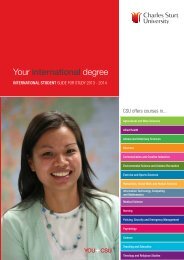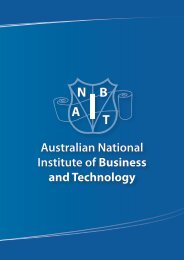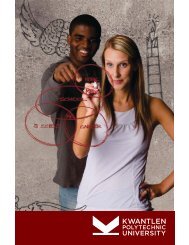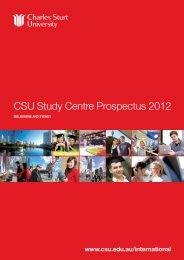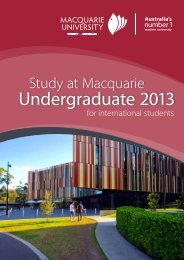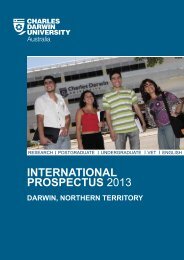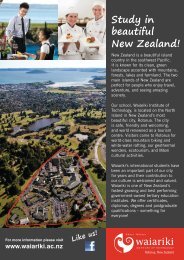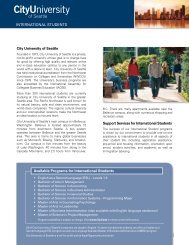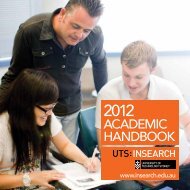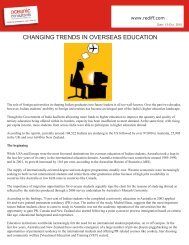International Undergraduate Prospectus - James Cook University
International Undergraduate Prospectus - James Cook University
International Undergraduate Prospectus - James Cook University
Create successful ePaper yourself
Turn your PDF publications into a flip-book with our unique Google optimized e-Paper software.
Australian Visa Information<br />
It is essential that you apply for an Australian<br />
student visa before arriving in Australia.<br />
To apply you need to contact your nearest<br />
Australian Embassy, Consulate or High<br />
Commission.<br />
www.dfat.gov.au/missions.You can also<br />
contact the Department of Immigration and<br />
Citizenship (DIAC). The DIAC website contains<br />
comprehensive information about applying<br />
for visas, student work rights and restrictions,<br />
health requirements, and FAQs (Frequently<br />
Asked Questions) about student visas.<br />
www.immi.gov.au/immigration<br />
Streamlined Visa Processing<br />
JCU is a participant in the Streamlined Visa<br />
Processing arrangements used by DIAC to<br />
assess applications for an Australian Student<br />
Visa. Streamlined Visa Processing simplifies<br />
the student visa assessment process and<br />
may reduce the amount of documentation<br />
required, particularly for applicants from<br />
countries with a DIAC Assessment Level<br />
of 3 or 4.<br />
You will be eligible for Streamlined Visa<br />
Processing if you have accepted an offer, and<br />
received a Confirmation of Enrolment (CoE),<br />
for a place in a JCU registered course.<br />
DIAC must be satisfied that you are a Genuine<br />
Temporary Entrant, that your primary purpose<br />
for coming to Australia is to study and that you<br />
are a Genuine Student. You must meet DIAC’s<br />
health and character requirements, and DIAC<br />
will also require you to declare that you have<br />
sufficient funds to pay your tuition fees and<br />
support yourself for the duration of your course.<br />
For more information about DIAC’s Genuine<br />
Temporary Entrant and Genuine Student<br />
requirements see www.immi.gov.au/<br />
students/_pdf/2011-genuine-temporaryentrant.pdf.<br />
ESOS Act and Tuition Protection Service<br />
As a provider of education services to<br />
international students in Australia, <strong>James</strong><br />
<strong>Cook</strong> <strong>University</strong> is required to comply with the<br />
Education Services for Overseas Students Act<br />
(ESOS Act) and the National Code of Practice<br />
for Registration Authorities and Providers of<br />
Education and Training to Overseas Students<br />
(The National Code). The ESOS legislation and<br />
National Code specify minimum standards for<br />
the delivery of courses to students in Australia<br />
studying on a student visa and regulate what<br />
information must be given to existing and<br />
prospective international students, what<br />
support must be provided to existing students,<br />
what records are kept and what information<br />
is to be given to government agencies about<br />
international students. For more information<br />
visit the Australian Education <strong>International</strong><br />
website and follow the links to ESOS at<br />
https://www.aei.gov.au.<br />
JCU’s Tuition Fee Policy for <strong>International</strong><br />
Students applies to overseas students who<br />
do not commence their studies with JCU, or<br />
withdraw before their course is completed.<br />
The Policy sets out the circumstances in which<br />
a student is entitled to a refund as required<br />
under the ESOS Act, and can be found at<br />
www.jcu.edu.au/policy/student/finance/<br />
JCUDEV_005357.html.<br />
The Tuition Protection Service (TPS) is a<br />
placement and refund service for international<br />
students studying on a student visa which<br />
also operates under the ESOS Act. The TPS<br />
replaces the Tuition Assurance Scheme<br />
and the ESOS Assurance Fund. On the rare<br />
occasions that a provider is unable to deliver<br />
a course an international student has paid<br />
for and does not meet their legal obligations<br />
to make alternative course replacements or<br />
provide a refund, the TPS will assist students<br />
to find an alternative place or, if this is not<br />
possible, provide a refund of any unspent<br />
tuition fees. For further information visit<br />
https://tps.gov.au/Information/Students/How.<br />
Deferral, temporary suspension or<br />
cancellation of enrolment<br />
The ESOS National Code and student visa<br />
conditions contain restrictions on when<br />
you, or JCU, can defer, suspend or cancel<br />
your enrolment. You may only defer<br />
commencement of your study or take a<br />
leave of absence once you have commenced<br />
when there are compassionate or compelling<br />
reasons for doing so. A “compassionate or<br />
compelling reason” is something which is<br />
beyond your control and which has, or will<br />
have, an impact on your academic progress<br />
or wellbeing. The <strong>University</strong> may temporarily<br />
suspend a student temporarily, enforcing a<br />
break from study, in certain circumstances. For<br />
details visit www.jcu.edu.au/international/<br />
public/groups/everyone/documents/policy/<br />
jcuprd_034357.pdf.<br />
Working as a student<br />
Under Australian immigration regulations,<br />
students on a student visa may work up to 40<br />
hours per fortnight during university teaching<br />
periods and without restriction during<br />
university vacations. Permission to work<br />
in Australia will be automatically included<br />
when you are granted your student visa. The<br />
JCU Careers and Employment Service can<br />
provide information on part-time and casual<br />
employment and manage an online job<br />
vacancy listing for students.<br />
Working rights for your partner<br />
If your spouse is joining you, he or she can<br />
also work while you are studying in Australia<br />
and can apply for a permission to work visa.<br />
The work conditions for your spouse will vary<br />
depending on the degree that you are taking.<br />
Bringing your family<br />
Your spouse and children can join you in<br />
Australia but each family member must be<br />
added to the student visa application, and<br />
certain conditions will apply depending on the<br />
age of each member. If you have children who<br />
will be attending school while in Australia, you<br />
will have to pay school fees for them. More<br />
information can be found at www.eqi.com.au/<br />
programs/dependant-student.html#fees<br />
Getting to JCU<br />
Cairns<br />
Cairns has Australia’s fifth busiest<br />
international airport. There are direct flights<br />
from Japan (four cities), Hong Kong, Papua<br />
New Guinea, New Zealand, Micronesia, Bali<br />
and Singapore, with more routes planned for<br />
the future. Numerous airlines fly from Sydney<br />
and Brisbane into Cairns daily.<br />
Townsville<br />
Three airlines fly from Brisbane to Townsville<br />
several times a day. Students can also fly<br />
directly to Cairns and then take the 50-minute<br />
shuttle flight to Townsville. Students at the<br />
Townsville campus are strongly recommended<br />
to fly into Townsville, as it is a 4-hour drive<br />
from Cairns and a 16-hour drive from<br />
Brisbane. There are also regular, direct flights<br />
from Sydney and Melbourne into Townsville.<br />
Singapore<br />
Singapore is an international destination with<br />
daily flights to and from the citystate from all<br />
over the world.<br />
| 53




